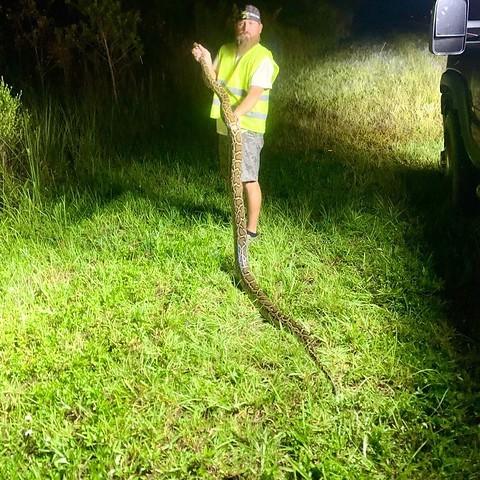It’s official: this year’s Florida Python Challenge has a winner.
The $10,000 grand prize went to Ronald Kiger, who retrieved 20 Burmese pythons from the Florida Everglades during the 10-day hunt, which was meant to raise awareness of the threat these pythons pose to the ecosystem. He was the direct runner-up to last year’s grand prize winner.
Representatives of the Florida Fish and Wildlife Conservation Commission announced Kiger’s victory at a Tuesday morning rally in Duck Key. This year, more than 800 people from 33 states and Canada participated in the challenge, and hunters took 195 Burmese pythons from the wild.
The remainder of the prize money was divided among competitors in the contest’s three categories: novice, professional, and military. Donna Kalil was one python shy of a tie with Kiger. Kalil, a contractor with the South Florida Water Management District, was awarded a $2,500 prize for capturing 19 pythons in the professional category.
“I’m not afraid of that python,” Kalil said recently told CBS News“I’m afraid it’ll escape.”
Florida Fish and Wildlife Conservation Commission
Also in the professional category, Marcos Rodriguez caught 16 pythons, worth $1,500, and Quentin Archie won a $1,000 prize for catching the longest python in this category, measuring 2.80 meters in length.
Thomas Hobbs won $2,500 for leading the novice category by capturing 16 Burmese pythons, while Dennis Krum captured the longest python in that category and also of the entire competition, measuring 9 feet 11 inches.
Jeff Lince captured five pythons, winning $2,500 in the military category, and Antonio Ramos won $1,000 for capturing the longest python in this group, measuring 9 feet 7 inches.
The challenge took place in mid-August, with hunters tasked with humanely killing Burmese pythons and delivering the carcasses to one of the contest’s three checkpoints in South Florida.
The challenge wasn’t just meant to give hunters a shot at some of the roughly $25,000 in prizes. It also served to raise awareness about the dangers of Burmese pythons, including how they affect native snakes, can spread disease to native wildlife, and have high mercury levels that are dangerous for human consumption.
“Since 2017, more than 14,000 pythons have been successfully removed by FWC and South Florida Water Management District contractors,” said Rodney Barreto, chairman of the Florida Fish and Wildlife Conservation Commission, in a press release. “This collaborative effort continues to have a direct positive impact on the Everglades and our native wildlife through removal and awareness.”
This year’s competition was slightly smaller than last year. In 2023, over 1,000 hunters participated and 209 pythons were removed.
“Every invasive python removed makes a difference for Florida’s environment and native wildlife,” said Bergeron, a board member of the South Florida Water Management District.
Hunters under contract with the state wildlife commission and the South Florida Water Management District work year-round to remove the invasive pythons from the wild. A female python can lay about 50 to 100 eggs at a time, so the contest is held during breeding season in August. According to the wildlife agency, about 22,000 pythons have been removed from the state since 2000.
The Burmese python population exploded in the mid 90’s after being imported from South Asia as exotic pets. Burmese pythons are usually between six and nine feet long, but can more than 15 feet longAccording to the Florida Museum of Natural History, they are not venomous and generally do not attack humans or pets, but pose a threat to nature native to the area.
Populations of native birds, rabbits, raccoons and deer have been decimated, and even alligators have fallen prey to the boa constrictors. They have no natural enemies.





